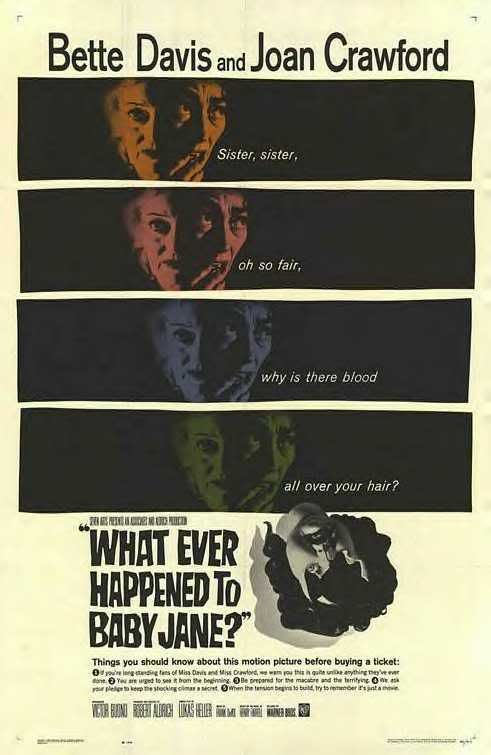 DIRECTED BY
DIRECTED BYRobert Aldrich
STARRINGBette Davis - Jane Hudson
Joan Crawford - Blanche Hudson
Victor Buono - Edwin Flagg
Maidie Norman - Elvira Stitt
Anna Lee - Mrs. Bates
Marjorie Bennett - Della Flagg
Year - 1962
Score - 4 Howls Outta 4
I think we all know by now that child stars have it rough. They become famous at such a young age due to their adorable looks and their potential for talent. They're recognized all over the world for the roles they played as children, sometimes typecasting them into that role. The real struggle is adapting to adolescence and adulthood. While the talent may still be there, the looks either change or fade away. Some child stars have made it to this step. Jodie Foster, Brooke Shields, Sean Astin, Anthony Michael Hall, Christian Bale, Drew Barrymore and Sarah Michelle Gellar are perfect examples. But as always, a lot of them don't get the opportunity to become bigger stars as adults. They turn to drugs, alcohol, or even suicide to deal with the rejection and lack of work. Corey Haim, Todd Bridges, Jodie Sweetin, and especially cases like the late Dana Plato and Jonathan Brandis show us how hard it is to grow up as a child star.
This is what makes WHAT EVER HAPPENED TO BABY JANE? an interesting piece of cinema. After 45 years, these child stars still haven't learned from the deterioration of Jane Hudson, played by Bette Davis. A famous child star who's light was dimmed when her older sister became a bigger star than her later on, Jane turned to alcohol and tortured her wheelchair-bound sister every chance she got to compensate for her inability to adapt with the times. The fact that we still see this in some child stars makes this film more scary than it has any right to be.
PLOTWe start in 1917 where 'Baby' Jane Hudson (Julie Allred) is a extremely p
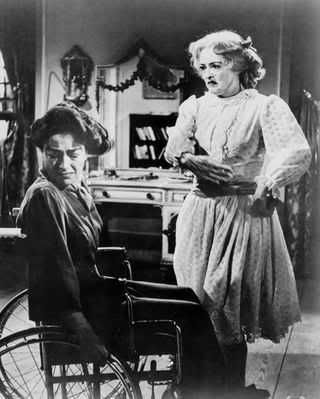 opular child star on the variety show circuit. Her song, "I've Written A Letter To Daddy", pleases the audience to the point that a doll is made in her image. But although she's adorable on stage, off-stage Jane's a real spoiled brat. It doesn't help that her manager father lets Jane do whatever she wants. This upsets Jane's older sister, Blanche (Gina Gillespie), who promises to never be like that when she becomes famous. By 1935, the tables have turned. Blanche (Joan Crawford) is now a very famous movie star while Jane (Bette Davis) struggles for jobs and only gets work because Blanche has clout in Hollywood.
opular child star on the variety show circuit. Her song, "I've Written A Letter To Daddy", pleases the audience to the point that a doll is made in her image. But although she's adorable on stage, off-stage Jane's a real spoiled brat. It doesn't help that her manager father lets Jane do whatever she wants. This upsets Jane's older sister, Blanche (Gina Gillespie), who promises to never be like that when she becomes famous. By 1935, the tables have turned. Blanche (Joan Crawford) is now a very famous movie star while Jane (Bette Davis) struggles for jobs and only gets work because Blanche has clout in Hollywood.Blanche's success comes to a screeching halt one night when someone, who many believe was a jealous Jane, rams into Blanche with her own car. The hit was so bad that Blanche now needs a wheelchair to be mobile. This leads us to 1962, where Jane and Blanche live together in a small house that's paid for through Blanche's fortunes as an actress. Jane is a very unhappy and unstable caretaker, jealous that people want to see Blanche over her. This feeling of resentment makes Jane treat Blanche poorly to the point of no return.
REVIEW
WHAT EVER HAPPENED TO BABY JANE? is probably seen as more of
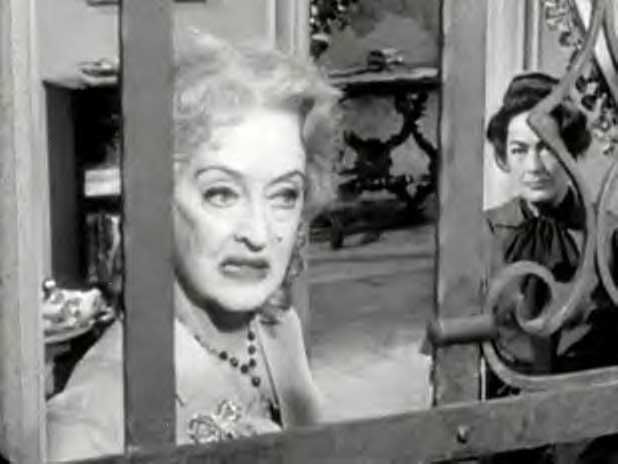 a campy satire more than a horror film, especially these days. But there is something horrific about a former child star who feeds dead parrots and rats to her trapped, crippled sister while singing horribly the song that made her famous almost 50 years ago. If that doesn't creep you out while laughing at it, then you must be the coldest S.O.B. alive. Obviously, Stephen King and Rob Reiner saw this film as an inspiration for the modern-day classic MISERY, where some of the elements were taken from WEHTBJ?. But while MISERY was more in-your-face with its terror, WEHTBJ? is more subtle. It slowly builds, and builds, and builds as Jane Hudson becomes more and more unstable as the film goes on.
a campy satire more than a horror film, especially these days. But there is something horrific about a former child star who feeds dead parrots and rats to her trapped, crippled sister while singing horribly the song that made her famous almost 50 years ago. If that doesn't creep you out while laughing at it, then you must be the coldest S.O.B. alive. Obviously, Stephen King and Rob Reiner saw this film as an inspiration for the modern-day classic MISERY, where some of the elements were taken from WEHTBJ?. But while MISERY was more in-your-face with its terror, WEHTBJ? is more subtle. It slowly builds, and builds, and builds as Jane Hudson becomes more and more unstable as the film goes on.Bette Davis perfectly brings the evolution of a monster to life on-screen as Jane. She could have overacted and turned the villain of the film into an over-the-top clown that tries to scare the audience, but usually does the opposite. But Davis doesn't do that, as she gives a real performance of a woman who still believes she's that child performing a song for her father. She wears the same baby doll outfit, her hair is curled up like a little girl, and wears massive amounts of make-up that even a beauty pageant contestant would be jealous of. To watch her succumb to alcoholism to deal with the fact that she's not that little star anymore projects a real image of a woman who doesn't have the ability to deal. The only enjoyment she gets is torturing her sister Blanche, which makes her creepy, demented, and sadistic. She even knows how to forge her sister's signature and speak just like her sister [the only talents she really has]. She's so unstable that we don't know what she's gonna do or when she's gonna do it. But we do know that something is gonna happen. It's pure psychological terror, and Davis deservingly earned her last Academy Award nomination for Jane Hudson. She's the star of this film [even though I'm sure Joan Crawford hated that] and she's the main reason you keep watching. Sometimes you don't need to see murder or gore to be horrified. Sometimes all you need is a person to act crazy.
I think what actually helps the film is the hatred between the two lead actresses. It's common knowledge that Bette Davis and Joan Crawford loathed each other. Crawford believed that Davis wouldn't have been a star without her mannerisms and big pop eyes. Davis rebutted by calling Crawford a casting couch whore. And while they worked beautifully together on-screen, which makes this pairing that much more fascinating, they tried to destroy each other off-screen. There are stories of Crawford putting weights in her pockets before a scene where Davis has to drag her across the floor. The incident hurt Davis' back. Also, Davis had installed a Coke machine in the studio because Crawford's late husband used to be the CEO of Pepsi. And when Davis has to attack Crawford before the dangling scene, Davis really kicks Crawford in the head. Crawford needed stitches after the fact. Just really bitter actresses who couldn't stand each other, yet created a wonderful bizarre chemistry that really drives the film into the classic status that it deserves.
Robert Aldrich, who also directed THE DIRTY DOZEN and the original THE LONGEST YARD, really does a phenomenal job in the director's chair. He gives the film that PSYCHO feel at some instances [the neighbor is called Mrs. Bates for a reason], but never achieves that level [which I don't think is a bad thing - you'll just look inferior next to PSYCHO]. I think Aldrich's greatest achievement is turning Davis and Crawford into monsters, especially Davis. I mean Davis was probably in her 50s during the filming of the film but with her pale skin and buckets of make-up on her face, she looks 30 years older. And the surreal ending, where a lot of things are revealed, seems to want us to feel sympathy for Jane as if Blanche really deserved what she got, even when the rest of the film didn't allow that level of sympathy. But it never seems forced or tacked on, which really makes you think that just like these child stars, what you see is not always what's real.
I also thought Aldrich did a good job with tension and suspense. For example, Crawford trying to go down the stairs to call for help with her crippled legs while Davis is returning home from stealing her sister's money is nail-biting. And the scene with Crawford throwing a crumpled note to her neighbor has a lot of tension, which leads to the infamous dead rat sequence where we get this spinning over-the-top view as Crawford screams for her life. And the black and white photography is incredible and it really brings out the unglamorous look of both Davis and Crawford. I don't think it would have worked so well if it were in color. Just a really well-directed film from beginning to end.
As for the acting, Davis was the star of the show. However, the other actors
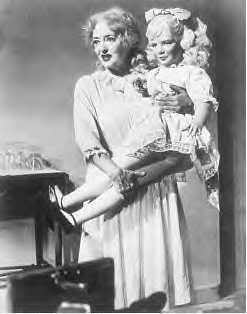 were very good as well. Joan Crawford was the most sympathetic sister, Blanche, who was restricted to a wheelchair for the majority of the film. Unlike Davis, Crawford's performance was more down-to-earth. She was the good-hearted and naive sister who wanted to see the best in Jane, even when the truth about her was right in front of her. Crawford does a great job making us care about Blanche, making us hope that she wakes up and sees Jane for who she really is. We root for her when she gets out of her room/prison and tries to call for help in order to regain some semblance of her life. It works even better when Davis' Jane is in the scene, as the two are really polar opposites of each other, creating perfect foils for the film.
were very good as well. Joan Crawford was the most sympathetic sister, Blanche, who was restricted to a wheelchair for the majority of the film. Unlike Davis, Crawford's performance was more down-to-earth. She was the good-hearted and naive sister who wanted to see the best in Jane, even when the truth about her was right in front of her. Crawford does a great job making us care about Blanche, making us hope that she wakes up and sees Jane for who she really is. We root for her when she gets out of her room/prison and tries to call for help in order to regain some semblance of her life. It works even better when Davis' Jane is in the scene, as the two are really polar opposites of each other, creating perfect foils for the film.Victor Buono was also good in his small role as Edwin Flagg. He's amusing as a mama's boy and he's a bit charming with his really weird English accent, especially in scenes with Davis. I found his facial expressions while Davis sings "I've Written A Letter To Daddy" really funny because I had the same ones on mine. Buono earned an Academy Award nomination as well for this role.
THE FINAL HOWLWHAT EVER HAPPENED TO BABY JANE? is one of those film
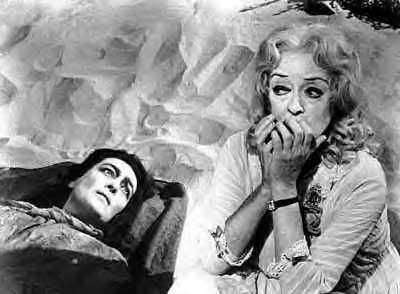 s that's either gonna make you laugh or chill you with some campy performances. It just shows that the life of a washed-up child star isn't so easy. If you ever want to know what the Simpson sisters will be up to in 30 to 40 years? Watch this film.
s that's either gonna make you laugh or chill you with some campy performances. It just shows that the life of a washed-up child star isn't so easy. If you ever want to know what the Simpson sisters will be up to in 30 to 40 years? Watch this film.

I want to bugger Bette Davis and Joan Crawford (as they were in 1926 and 1923 respectively, the years they celebrated their 18th birthdays, not as they were in this movie, or even as they are now obviously, which is long since dead).
ReplyDelete